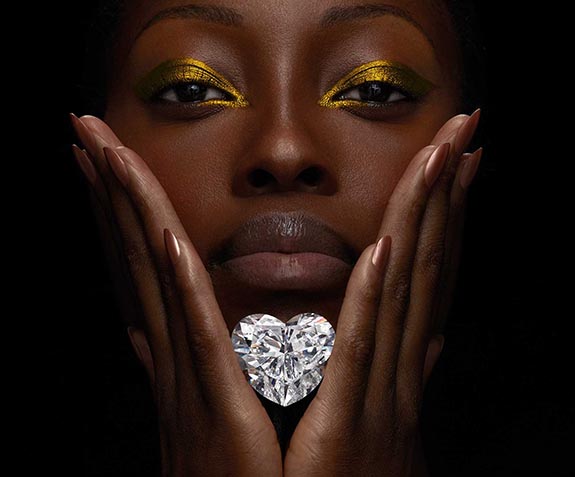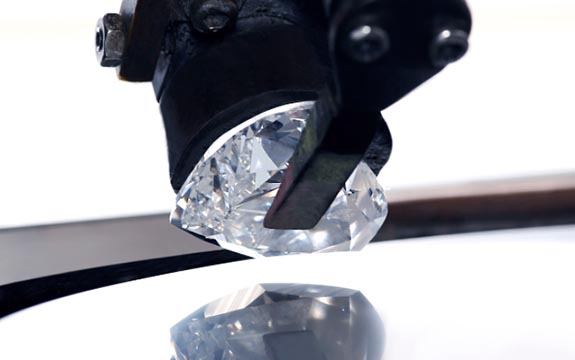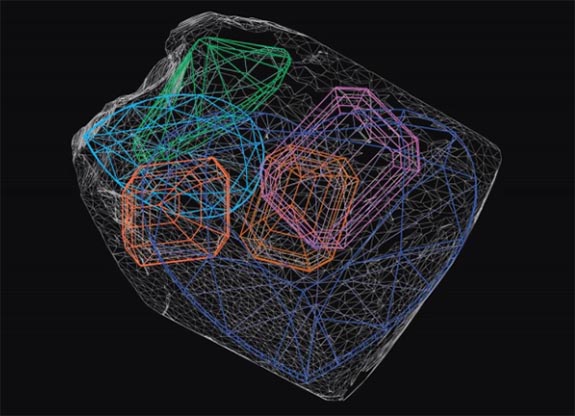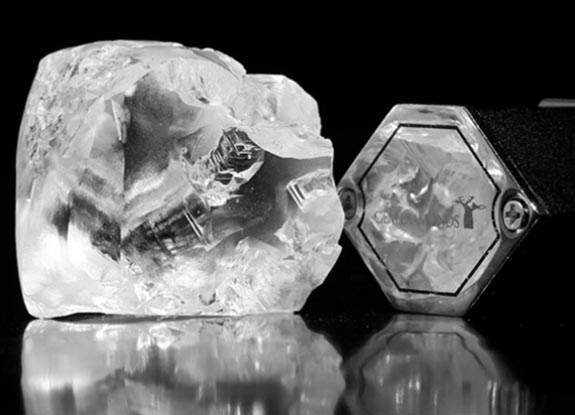November 3rd, 2016
Laurence Graff, the billionaire jeweler whose name is attached to some of the most famous diamonds in the world, has introduced the Graff Venus, the world's largest D-flawless heart-shaped diamond.

About the size of a walnut and weighing 118.78-carats, the Graff Venus was painstakingly extracted from a 357-carat rough diamond that was sourced last year at the Letšeng Mine in Lesotho.
Heart-shaped diamonds are generally a high-risk proposition for cutters because the unusual shape is prone to cracking during the cleaving and polishing process. Graff's risk was multiplied many times due to the enormous size and value of the stone.

The process took 18 months, during which Graff and his team analyzed every excruciating detail of the rough stone. They even had to develop special tools to cut the stone.

The computer-generated illustration shows how the heart-shaped diamond (dark blue outline) was segmented from the rest of the original rough. Twenty-two additional diamonds were culled from the same piece.
The London-based chairman of Graff Diamonds — whose diamond collection includes the 24.78-carat Graff Pink, 102.79-carat Graff Constellation and the 31.06-carat Wittelsbach-Graff — couldn't be more proud of his latest creation, calling it "absolute perfection."
"The stone itself is beyond words," he said. "It is the most beautiful heart-shape diamond I have ever seen.”
The Gemological Institute of America agreed by awarding its highest grades to the Graff Venus. The stone was rated D-color, flawless, Type IIa with excellent polish and symmetry. Type IIa diamonds are almost or entirely devoid of impurities.
The Graff marketing team believes the diamond will eventually be incorporated into a pendant, brooch or tiara.
According to the Robb Report, Graff has had a role in cutting and polishing more than half of the 20 most exceptional diamonds discovered during the past century.

The Letšeng mine, which sits at an altitude of 10,000 feet in the tiny kingdom of Lesotho near the southern tip of Africa, has a long history of producing top-quality diamonds in huge sizes. The 357-carat rough diamond from which the Graff Venus was extracted had netted $19.3 million for Gem Diamonds in September of 2015. At the time, it was sold to a unnamed buyer.
Credits: Graff Venus images courtesy of Graff Diamonds. Rough diamond courtesy of Gem Diamonds.

About the size of a walnut and weighing 118.78-carats, the Graff Venus was painstakingly extracted from a 357-carat rough diamond that was sourced last year at the Letšeng Mine in Lesotho.
Heart-shaped diamonds are generally a high-risk proposition for cutters because the unusual shape is prone to cracking during the cleaving and polishing process. Graff's risk was multiplied many times due to the enormous size and value of the stone.

The process took 18 months, during which Graff and his team analyzed every excruciating detail of the rough stone. They even had to develop special tools to cut the stone.

The computer-generated illustration shows how the heart-shaped diamond (dark blue outline) was segmented from the rest of the original rough. Twenty-two additional diamonds were culled from the same piece.
The London-based chairman of Graff Diamonds — whose diamond collection includes the 24.78-carat Graff Pink, 102.79-carat Graff Constellation and the 31.06-carat Wittelsbach-Graff — couldn't be more proud of his latest creation, calling it "absolute perfection."
"The stone itself is beyond words," he said. "It is the most beautiful heart-shape diamond I have ever seen.”
The Gemological Institute of America agreed by awarding its highest grades to the Graff Venus. The stone was rated D-color, flawless, Type IIa with excellent polish and symmetry. Type IIa diamonds are almost or entirely devoid of impurities.
The Graff marketing team believes the diamond will eventually be incorporated into a pendant, brooch or tiara.
According to the Robb Report, Graff has had a role in cutting and polishing more than half of the 20 most exceptional diamonds discovered during the past century.

The Letšeng mine, which sits at an altitude of 10,000 feet in the tiny kingdom of Lesotho near the southern tip of Africa, has a long history of producing top-quality diamonds in huge sizes. The 357-carat rough diamond from which the Graff Venus was extracted had netted $19.3 million for Gem Diamonds in September of 2015. At the time, it was sold to a unnamed buyer.
Credits: Graff Venus images courtesy of Graff Diamonds. Rough diamond courtesy of Gem Diamonds.


